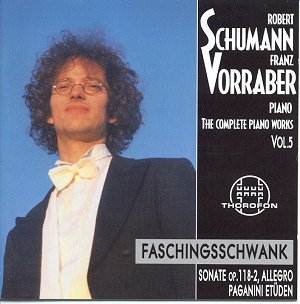Schumannís
piano music still strikes fear into the heart of the majority
of pianists, not just for its technical unwieldiness, but also,
and above all, because of its emotional complexity. It is little
wonder then that only a small and select handful of pianists have
ever attempted, in concert or on record, his complete works for
solo piano. Only Peter Frankl, Jörg Demus and Karl Engel
have previously recorded the entire oeuvre. Thorofon have embarked
on this project, only the fourth complete set ever, entrusting
the task to the young and relatively unknown Austrian pianist,
Franz Vorraber.
The
very informative sleeve note quotes Schumann thusÖ"The
pearl does not lie near the surface; it must be sought in the
depths, despite the danger." Poignant and daunting at
the same time, but Vorraber nevertheless sets out to persuade
the listener that he has valiantly embarked upon this very perilous
voyage.
He
brings a youthful vigour, and maturity beyond his tender years,
to a performance that begins with the Paganini Etudes Op.10. These
etudes, inspired by Paganiniís Caprices for solo violin become
more than mere vehicles for the display of technical prowess once
Schumannís unique perspective has been brought to bear upon them.
Vorraberís ease of execution almost verges on carefree abandon,
and the listener is at once convinced of his undoubted virtuosity,
a virtuosity that is however always subservient to the complex
emotional demands of the music.
The
Allegro Op.8 is likewise presented with absolute technical assurance,
but without the poetic aspects of the music suffering any neglect
whatsoever.
Of
the three Sonatas Op.118, that Schumann dedicated to his three
eldest daughters, the second, for Elise, is by far the more demanding.
The opening Allegro, terribly formal in concept and structure
is delivered faithfully enough, whilst the Canon and Abendlied
live up to expectations. The finale however is invested with a
far greater urgency and zealously portrays the effervescence of
youth.
In
the five movement Faschingsschwank Aus Wien, Vorraberís interpretation
successfully reveals the work for the romantic masterpiece that
it truly is. The dramatic opening Allegro movement begins with
an almost studied grandeur, but the intrinsic infectious optimism
and playfulness are never neglected. The romance plaintively weaves
a painful web of emotions and the arrival of the playful scherzo
is almost a relief. The dark and mysterious aspects of the intermezzo
are succinctly revealed and the exuberant finale is boldly despatched,
with the utmost virtuosic abandon.
This
project, to record all Schumannís piano music on thirteen discs
is a bold undertaking and Thorofon appear to have matched an exceptional
artist with a composer whose music appears to course through his
veins.
If
I have any reservations at all, they relate to the sound of the
Bösendorfer piano, which Vorraber favours. Whilst he achieves
great clarity throughout, I occasionally find the sound of the
upper registers of the piano somewhat brittle.
Leon
Bosch
